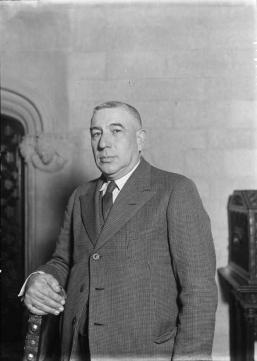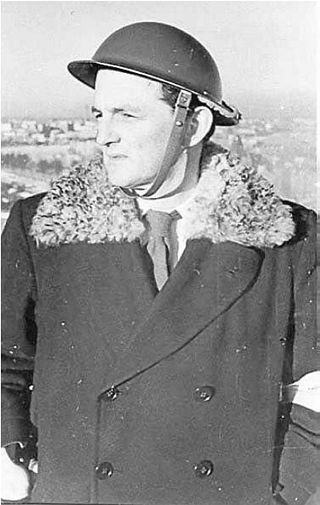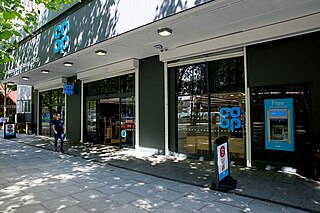
Lluís Companys i Jover was a Catalan politician who served as president of Catalonia, Spain from 1934 and during the Spanish Civil War.

The Spanish Revolution was a social revolution that began at the outbreak of the Spanish Civil War in 1936, following the attempted coup to overthrow the Second Spanish Republic and arming of the worker movements and formation of militias to fight the Nationalists. It featured takeover of power at local levels by the Spanish workers' organizations and social movements, seizure and reorganization of economic facilities directed by trade union groups and local committees, and widespread implementation of socialist, more narrowly, libertarian socialist and anarchist organizational principles throughout various portions of the Republican zone, primarily Catalonia, Aragon, Andalusia, and parts of the Valencian Community.
The Co-operative Party is a centre-left political party in the United Kingdom, supporting co-operative values and principles. The party currently has an electoral pact with the Labour Party. Established in 1917, the Co-operative Party was founded by co-operative societies to campaign politically for the fairer treatment of co-operative enterprise and to elect co-operators to Parliament. The party's roots lie in the Parliamentary Committee of the Co-operative Union established in 1881.

Josep Irla i Bosch was a Catalan businessman and politician. He was a deputy in the Parliament of Catalonia and the Spanish Congress in 1932, as an Esquerra Republicana de Catalunya affiliate. He was also the last President of Parliament of Catalonia at the end of Republican Catalan resistance in the Spanish Civil War, before Francisco Franco abolished the Generalitat of Catalonia. He was elected President of the Parliament of Catalonia on 1 October 1938. In office, Irla pushed for cooperation with the allies, Basque nationalists and other anti-Francoist groups, though excluding the communists. He became the President-in-exile of the Generalitat after Lluís Companys was executed. During his time as President-in-exile, he established a Government in exile, and appointed Josep Tarradellas as Conseller en Cap. He resigned as President in 1954.

The Spanish Civil War (1936–1939) broke out with a military uprising in Morocco on July 17, triggered by events in Madrid. Within days, Spain was divided in two: a "Republican" or "Loyalist" Spain consisting of the Second Spanish Republic, and a "Nationalist" Spain under the insurgent generals, and, eventually, under the leadership of General Francisco Franco.

The Royal Arsenal Co-operative Society (RACS) was a large consumer co-operative based in south east London, England. The co-operative took its name from the Royal Arsenal munitions works in Woolwich and its motto was: "Each for all and all for each". In 1985 it merged into the national Co-operative Wholesale Society.
The London Co-operative Society (LCS) was a consumer co-operative society in the United Kingdom.

Revolutionary Catalonia was the period in which the autonomous region of Catalonia in northeast Spain was controlled or largely influenced by various anarchist, communist, and socialist trade unions, parties, and militias of the Spanish Civil War era. Although the constitutional Catalan institution of self-government, the Generalitat of Catalonia, remained in power and even took control of most of the competences of the Spanish central government in its territory, the trade unions were de facto in command of most of the economy and military forces, which includes the Confederación Nacional del Trabajo which was the dominant labor union at the time and the closely associated Federación Anarquista Ibérica. The Unión General de Trabajadores, the POUM and the Unified Socialist Party of Catalonia were also prominent.
The history of the cooperative movement concerns the origins and history of cooperatives across the world. Although cooperative arrangements, such as mutual insurance, and principles of cooperation existed long before, the cooperative movement began with the application of cooperative principles to business organization.

The Aragon Offensive was an important military campaign during the Spanish Civil War, which began after the Battle of Teruel. The offensive, which ran from March 7, 1938, to April 19, 1938, smashed the Republican forces, overran Aragon, and conquered parts of Catalonia and the Levante.

The Catalonia Offensive was part of the Spanish Civil War. The Nationalist Army started the offensive on 23 December 1938 and rapidly conquered Republican-held Catalonia with Barcelona. Barcelona was captured on 26 January 1939. The Republican government headed for the French border. Thousands of people fleeing the Nationalists also crossed the frontier in the following month, to be placed in internment camps. Franco closed the border with France by 10 February 1939.

John Eric Langdon-Davies was a British author and journalist. He was a war correspondent during the Spanish Civil War and the Soviet-Finnish War. As a result of his experiences in Spain, he founded the Foster Parents' Scheme for refugee children in Spain, which is now the aid organisation Plan International.

Co-op is a UK supermarket chain and the brand used for the food retail business of The Co-operative Group, one of the world’s largest consumer co-operatives. As the UK’s fifth largest food retailer, Co-op operates nearly 2,400 food stores. It also supplies products to over 6,000 other stores, including those run by independent co-operative societies, through its wholesale business, Nisa Retail Limited.

The Republican faction, also known as the Loyalist faction or the Government faction, was the side in the Spanish Civil War of 1936 to 1939 that supported the government of the Second Spanish Republic against the Nationalist faction of the military rebellion. The name Republicans was mainly used by its members and supporters, while its opponents used the term Rojos (Reds) to refer to this faction due to its left-leaning ideology, including far-left communist and anarchist groups, and the support it received from the Soviet Union. At the beginning of the war, the Republicans outnumbered the Nationalists by ten-to-one, but by January 1937 that advantage had dropped to four-to-one.
Scottish Volunteers in the Spanish Civil War comprised 23% of the estimated 2,400 men and women who travelled from Great Britain to serve in the International Brigades in the Spanish Civil War. Along with the 549 military volunteers, extensive funds and support for Republican Spain were raised through a nationwide grass-roots Aid for Spain movement; per capita, Scotland's contributions were among the most substantial foreign aid offered to the Republic over the period of 1936–1939.

The Volem acollir protest was a protest march in Barcelona that took place on 18 February 2017. The purpose of the march was to demand more openness towards refugees and a more active role of the European Union in the European migrant crisis. They planned for it to be the largest protest in Europe and they achieved the goal. The size of the march was estimated at 160,000 by police and 500,000 by organisers.

When, in 1939, World War II erupted in Europe, Catalonia was part of Spain led by the caudillo Francisco Franco, who declared Spain neutral in the conflict. The country was devastated by the recently finished Spanish Civil War, which resulted in the defeat of the Second Spanish Republic and the creation of the Spanish State, and Catalonia, who was an autonomous region under the Republican government (1931-1939) lost the whole of its self-government when the Nationalist army occupied the area.

Dairygold Co-Operative Society Limited is an Irish dairy co-operative based in Mitchelstown, County Cork, Ireland. With its catchment area mostly in the Golden Vale, Dairygold processes an annual volume of approximately 1.43 billion liters of grass fed pastureland milk, making it Ireland's second largest dairy co-operative and the island's third largest milk supplier. Formed after the 1989 merger of the Mitchelstown and Ballyclough co-ops, as of 2023 it had 7000 shareholder members and an operating profit of €24 million from a turnover of €1.4 billion.

La Retirada was the exodus to France from Spain between 28 January 1939 and 15 February 1939 of nearly 500,000 Republican soldiers and civilians near the end of the Spanish Civil War. The exodus was caused by the conquest of Catalonia, including the city of Barcelona, by the right-leaning Nationalist army of Francisco Franco. With the capture of Catalonia, the Civil War soon ended in victory for the Nationalists.














